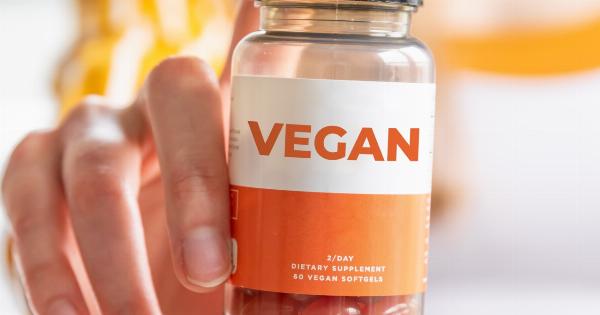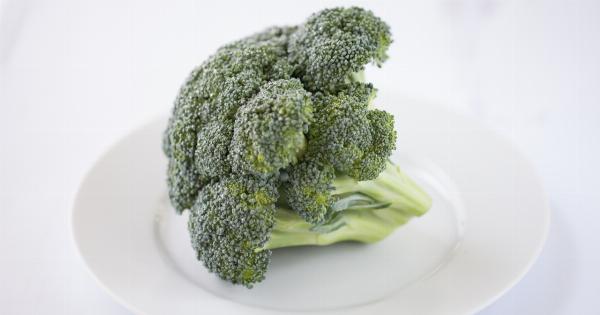Following a vegetarian diet can offer numerous health benefits, such as reducing the risk of heart disease, diabetes, and some types of cancer.
However, it is essential to ensure that you are getting all the necessary nutrients, especially when abstaining from animal products. Vegetarian nutrition supplements can help bridge the nutrient gap and support your overall well-being. In this ultimate guide, we will explore the importance of vegetarian supplements and cover the top ones to consider for optimal health.
Why Do Vegetarians Need Nutrition Supplements?
While a well-planned vegetarian diet can meet most of your nutritional needs, certain nutrients may be challenging to obtain solely from plant-based sources.
It is particularly important for vegetarians to pay attention to adequate intake of the following nutrients:.
1. Vitamin B12
Vitamin B12 is primarily found in animal products, and its deficiency is prevalent among vegetarians. This vitamin is crucial for the formation of red blood cells and proper nerve function.
Vegetarians should consider taking a B12 supplement, especially if they do not consume fortified foods like plant-based milk, breakfast cereals, or nutritional yeast.
2. Iron
Iron is essential for the production of hemoglobin, which carries oxygen to different parts of the body. Plant-based iron sources, known as non-heme iron, are not as easily absorbed by the body as heme iron found in animal products.
Including iron-rich foods like spinach, legumes, and fortified cereals in your diet is crucial. However, iron supplements may be necessary, particularly for those with increased iron needs, such as women of reproductive age.
3. Omega-3 Fatty Acids
Omega-3 fatty acids are crucial for brain health and reducing inflammation in the body. While fish is a common source of omega-3s, vegetarians can obtain them from plant-based sources like flaxseeds, chia seeds, walnuts, and algae-based supplements.
These supplements are a great way to ensure optimal intake, especially for individuals who do not consume enough omega-3 rich foods.
4. Vitamin D
Vitamin D plays a vital role in bone health and immune function. Although our body can produce vitamin D when exposed to sunlight, vegetarians may have a higher risk of deficiency.
Therefore, consider getting your vitamin D levels checked and discussing the need for supplementation with your healthcare provider.
5. Calcium
Calcium is important for strong bones and teeth, nerve function, and muscle health.
While milk and dairy products are common sources of calcium, vegetarians can explore plant-based options like leafy greens, tofu, fortified plant-based milks, and calcium supplements if necessary.
6. Zinc
Zinc is essential for boosting the immune system, wound healing, and DNA synthesis. Vegetarians may have a higher risk of zinc deficiency as plant foods have lower bioavailability of this mineral.
Including zinc-rich foods like legumes, nuts, and seeds in your diet, or considering a zinc supplement, can help meet your requirements.
7. Iodine
Iodine is crucial for thyroid function, metabolism, and brain development. While iodine is commonly found in seafood and iodized salt, vegetarians may need to ensure they are consuming adequate amounts.
Plant-based sources of iodine include seaweed, iodine-enriched salt, and iodine supplements if advised by a healthcare professional.
8. Protein
Although protein deficiencies are rare among vegetarians who consume a varied diet, it is important to ensure you are getting enough protein sources. Vegetarian protein sources include legumes, tofu, tempeh, quinoa, and other whole grains.
If you have increased protein needs, such as athletes or pregnant women, protein supplements like soy or pea protein powders can be considered.
9. Vitamin K2
Vitamin K2 is crucial for maintaining healthy bones and blood clotting. While vitamin K1 is abundant in plant foods like leafy greens, the conversion of K1 to K2 in the body may be limited.
Fermented soy products like natto and certain supplements can provide this essential nutrient.
10. Multivitamins
In addition to targeting specific nutrient deficiencies, vegetarians can benefit from a good quality multivitamin that covers a wide range of vitamins and minerals.
A vegetarian-specific multivitamin may be particularly beneficial as it takes into account the common nutrient gaps in the vegetarian diet. However, it is always advisable to consult with a healthcare professional before starting any new supplement.
Conclusion
Incorporating vegetarian nutrition supplements appropriately can help bridge nutrient gaps and ensure optimal health while following a vegetarian lifestyle.
While a well-planned vegetarian diet can meet most of your nutritional needs, supplements may be necessary to ensure you are meeting specific nutrient requirements. Remember to consult with a healthcare professional or registered dietitian to determine which supplements are most suitable for your needs. By paying attention to your nutrient intake, you can thrive on a healthy vegetarian diet.



























